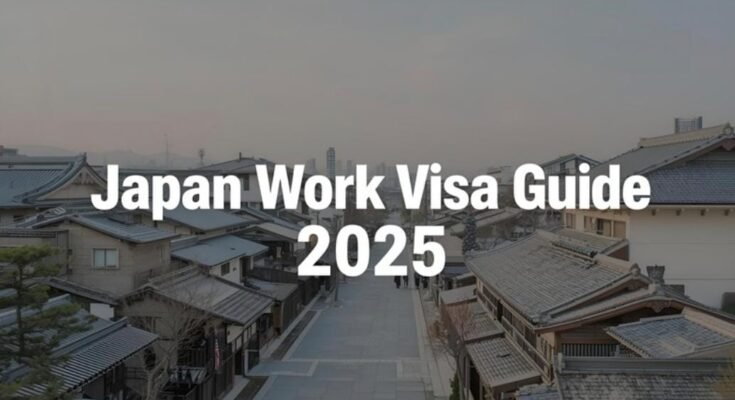Japan Work Visa Guide 2025: Step-by-Step Process
Japan has become a prime destination for Indian professionals looking to advance their careers globally. The latest 2025 visa guidelines simplify the process of obtaining a Japan work visa for Indians. This guide aims to demystify the employment in Japan landscape, focusing on the Japan work permit requirements. It’s designed to help Indian applicants navigate the path to securing their professional future in Japan.

Key Takeaways
- Insight into the new 2025 visa guidelines for Japan work visas aimed at Indian professionals.
- A clearer understanding of the legalities surrounding the Japan work permit process.
- Knowledge of the necessary steps to take towards securing employment in Japan.
- Guidance on navigating through the complexities of the Japan work visa application specific to Indians.
- Realization of the importance of preparing and organizing required documentation for a successful visa approval.
Introduction to Working in Japan
Japan’s economy is booming, offering a plethora of opportunities for skilled professionals worldwide. The country is actively seeking international talent to boost various sectors and stay competitive globally. This section delves into why Japan is becoming a key destination for foreign workers. It also highlights the diverse job opportunities available across multiple industries.
The Growing Demand for International Talent in Japan
Japan faces a significant workforce shortage due to an aging population and low birth rates. This shortage is most pronounced in IT, healthcare, engineering, and education. To address this, Japan is embracing foreign experts, enhancing its sustainability and innovation. Government and private sectors are working together to make it easier for foreign workers to join the Japan job market.
Types of Employment Opportunities in Japan for Foreigners
The job market in Japan is both diverse and rewarding. From bustling towns to cutting-edge cities, there are roles for everyone. Whether it’s teaching English or working in high-tech fields, the opportunities are vast. The healthcare sector, in particular, is experiencing a surge in demand for international professionals.

| Industry | Types of Roles | Expected Skills |
|---|---|---|
| Information Technology | Software Developer, AI Specialist | Coding, Machine Learning |
| Healthcare | Registered Nurse, Physical Therapist | Medical Certification, Experience |
| Education | Language Teacher, Curriculum Developer | Teaching Certification, Fluency in English |
| Engineering | Civil Engineer, Mechanical Engineer | Technical Skills, Project Management |
Types of Japan Work Visas
Japan has a range of work visa categories for professionals worldwide. It’s vital to understand these categories for those aiming to work in Japan. We’ll explore visas for skilled labor, company transferees, and highly skilled professionals in detail.
Skilled Labor Visa
The skilled labor visa Japan targets workers with unique skills in areas like construction, engineering, and specialized crafts. To qualify, applicants must show their qualifications and experience in their field.
Intra-Company Transferee Visa
The company transferee Japan visa is for employees moving from overseas offices to Japan. It’s key for multinational companies to maintain quality and consistency globally. Applicants must have at least a year of service with their company before the transfer.
Highly Skilled Professional Visa
The highly skilled professional visa Japan attracts elite talent in IT, research, and business management. It uses a points system to evaluate candidates based on education, career achievements, and salary. Those who meet the criteria can benefit from a quicker path to permanent residency and family support.

Each visa meets different needs in the Japanese labor market, bringing in international talent across various sectors. Prospective applicants should carefully choose the visa that matches their career aspirations and qualifications.
Eligibility Criteria for Japan Work Visa
Applying for a work visa in Japan requires a thorough evaluation of several criteria. Applicants must demonstrate educational achievements, professional experience, language proficiency, and health status. Grasping these requirements is essential for those eyeing a career in Japan.
Educational Qualifications and Work Experience
The eligibility for a Japan work visa heavily relies on the applicant’s educational background and professional experience. Typically, a bachelor’s degree or higher is required, along with relevant work experience in the field. These standards ensure that Japan’s workforce is highly skilled and can effectively contribute to the nation’s industry.
Language Requirements
While not a must for all visa types, Japan language proficiency can greatly enhance an applicant’s approval chances. For roles that involve direct interaction with Japanese clients or partners, knowing basic Japanese is beneficial and sometimes necessary.
Health and Character Certifications
Applicants must also fulfill visa health requirements, which include a detailed medical examination. A clean health record is crucial to prevent public health risks. Additionally, a background check is performed to verify the applicant’s good character and legal history, ensuring Japan’s safety and security.
| Criterion | Requirement | Notes |
|---|---|---|
| Educational Level | Bachelor’s or Higher | Field-specific degrees preferred |
| Professional Experience | Varies by Visa Type | Relevant to position |
| Language Proficiency | Not always mandatory | Basic to advanced, depending on role |
| Health Status | Medical check required | No contagious diseases |
| Character Certification | Background check | No criminal records |
Japan Work Visa Guide 2025: Step-by-Step Process
Understanding the Japan visa process 2025 can seem overwhelming. However, a detailed step-by-step work visa guide makes the path from job offer to visa approval clear and achievable. This guide outlines the work visa application steps crucial for professionals aiming to start their careers in Japan.
- Secure a Job Offer: The first step is securing a job offer from a Japanese company. This is the foundation of your visa application.
- Collect Necessary Documents: Gather your passport, academic certificates, resume, and the job offer letter from your employer in Japan.
- Apply for the Certificate of Eligibility (COE): Your employer in Japan will apply for your Certificate of Eligibility at the local immigration office. This document confirms you meet the requirements for entry into Japan.
- Visa Application Submission: After receiving the COE, apply for the visa at the Japanese embassy or consulate in your home country. You’ll need to submit your passport, COE, visa application form, photograph, and sometimes extra documents based on your visa type.
- Visa Processing: Wait for the visa processing, which can take from a few days to several weeks. The consulate might contact you for an interview during this time.
- Collection of Passport and Visa: Once your visa is approved, you’ll be informed to collect your passport with the visa.
- Preparation for Departure: With your visa in hand, you can book your travel to Japan. Make sure you have all necessary documents and belongings for a smooth transition.
Following these work visa application steps will greatly simplify the process, leading to a successful start in Japan. Always verify the latest information on the Japan visa process 2025 as regulations can evolve.
By meticulously following this guide, applicants can avoid missing any crucial steps in their application. This approach not only aids in organized planning but also sets realistic expectations for obtaining a work visa for Japan.
Documentation Required for Japan Work Visa Application
Applying for a Japan work visa requires careful preparation of several key documents. It’s vital to ensure all paperwork, including visa documentation Japan, is accurate and verifiable. This is crucial for a successful application. Below, we detail the essential documents needed, their significance, and tips for preparing and presenting them efficiently.
Passport and Photographs
A valid passport with at least six months of remaining validity and two blank visa pages is essential. You must also provide recent color photographs that adhere to the Japanese embassy or consulate’s guidelines. These photos should be taken against a white background, with the applicant facing forward.
Job Offer Letter and Employment Contract
The employment contract Japan is a critical component of the visa application. It must outline the job role, salary, employment duration, and working conditions. This contract proves your employment in Japan is legitimate. A formal job offer letter from the employer should accompany the contract, detailing the offer and acceptance.
Certificates of Eligibility
The certificate of eligibility is issued by Japan’s Immigration Services Agency. It confirms you meet the legal requirements to work in Japan. This certificate is necessary before a visa can be issued. The prospective employer in Japan must initiate the application on your behalf.
| Document | Description | Issued By |
|---|---|---|
| Passport | Valid and current with sufficient blank pages | Applicant’s home country |
| Photographs | Recent and as per specified guidelines | – |
| Job Offer Letter | Details offer and acceptance | Employing company in Japan |
| Employment Contract | Specifies job role, salary, and other employment terms | Employing company in Japan |
| Certificate of Eligibility | Confirms applicant’s eligibility to work in Japan | Japan’s Immigration Services Agency |
In conclusion, it’s crucial to meticulously check all visa documentation Japan requirements. Ensure your Japan work visa application is complete, and all documents, including the employment contract Japan and certificate of eligibility, are accurately prepared. This thorough preparation is essential for visa approval and a smooth transition into legal employment in Japan.
Finding a Sponsor in Japan
Securing a Japan visa sponsor is crucial for those seeking career opportunities in Japan. Your future employer acts as a sponsor, endorsing your visa application. This endorsement is key to fulfilling the work visa sponsor requirements set by Japanese immigration.
Candidates must seek employment with companies ready to sponsor visas in Japan. Once a job offer is received, the employer commits to sponsoring the applicant. They must verify the individual’s skills, stability, and economic contributions. This highlights the importance of a strong employment offer in the visa process.
Understanding employer sponsorship in Japan is essential. Employers must provide specific documents proving their ability to hire foreign nationals. These documents are vital for the visa application and approval.
- Job Offer Confirmation: Showing a direct offer of employment.
- Certificate of Eligibility: Your employer helps in obtaining this certificate, which confirms that you meet the minimal criteria for entering Japan.
- Sponsorship Letter: A formal letter where the employer outlines their intent to support your application and ensure your adherence to local laws and regulations.
Securing a job with employer sponsorship in Japan can significantly impact your visa application’s success. It’s wise to check the sponsor’s history in sponsoring work visas before accepting a job. This ensures they are proficient in the visa process.
Applying for the Certificate of Eligibility (COE)
Obtaining a Certificate of Eligibility Japan is crucial for those aiming to work in Japan. This document, provided by the Japanese Immigration Services, confirms an applicant’s eligibility to work legally. It not only facilitates the work visa application but also ensures the applicant’s suitability for employment in Japan.
Understanding the COE
The Certificate of Eligibility Japan serves as a preliminary check for visa applications. It is granted based on a job offer from a Japanese employer and other necessary documents. Once obtained, it greatly simplifies the visa application process at Japanese consulates or embassies globally.
Submission Process and Required Documents
The COE application process involves detailed steps and specific documents. The applicant or their sponsor in Japan must submit a comprehensive application to the regional immigration office. Here’s a breakdown of the required documents:
- Completed COE application form
- Passport-size photograph
- Copy of passport’s bio-page
- Documentation proving financial stability
- Details of the host organization in Japan including their legal registration
- Job description and employment contract
The COE application process typically takes 1-3 months for a decision. During this time, the applicant’s documents are thoroughly checked for authenticity and compliance with Japanese employment laws.
| Document | Importance | Details Required |
|---|---|---|
| Application Form | Essential | Complete all sections accurately. |
| Passport Photo | Required | Recent color photograph. |
| Employment Contract | Crucial | Includes terms, duration, and role specifics. |
| Financial Proof | Important | Bank statements or sponsorship letter. |
Where to Apply for Your Japan Work Visa
Finding the correct place to submit your Japan work visa application is crucial for a seamless immigration journey. You can choose between submitting in person at Japanese consulates or using online platforms. Knowing your options is essential.
Japanese Embassies and Consulates
Japanese consulates and embassies worldwide are the main Japan work visa application locations. The nearest Japanese consulate visa application center, based on your location, is where you should apply. These official government offices are ready to help you through the application process. They ensure you fulfill all necessary requirements.
Online Application Options
The online visa application Japan option is available for applicants. It streamlines the application by allowing you to submit documents and personal details online. This eliminates the need for a physical visit to a consulate. Always check the online portal’s legitimacy through official Japanese immigration websites. This protects your personal information and guarantees a valid application process.
| Application Option | Benefits | Considerations |
|---|---|---|
| Japanese Embassy or Consulate | Personalized assistance and verification | Requires physical visit, may be time-consuming |
| Online Application | Convenience of home submission, faster processing | Necessitates access to reliable internet, security verification |
Preparing for the Visa Interview
Mastering your Japan visa interview preparation is key to securing a work visa. It involves understanding common interview questions and having all necessary documents ready. Here are essential insights and tips for this critical step.
Common Questions and How to Answer Them
Applicants will face various questions during the visa interview. These are designed to evaluate your intentions, qualifications, and the validity of your plans in Japan. Some typical questions include:
- “What will be your role in the company you will be working for?”
- “How does your previous experience align with this new role?”
- “What are your career prospects or plans in Japan?”
To answer these questions well, highlight your dedication to your field and how your goals match the job in Japan. Showing a deep understanding of your role and its significance to the company is also crucial.
What Documents to Bring
Correct visa interview documentation is essential. Make sure to bring the following:
- Passport with at least six months’ validity
- Job offer letter and contract from your employer in Japan
- Recent passport-sized photographs
- Educational and professional certificates relevant to the job
Review and organize these documents carefully. Presenting them in a clear, orderly manner can make a positive impression.
Thorough preparation and ensuring all documents are complete and correctly ordered can simplify the visa interview process. Anticipating interview questions and having your documents ready will help you make a favorable impression on the day of your interview.
After Arrival: Next Steps and Resident Registration
Arriving in Japan brings excitement and a sense of challenge. You’ll need to quickly set up your Japan resident registration, open a Japan bank account for foreigners, and get a Japan mobile phone registration. These tasks are vital for settling in and meeting legal requirements. They also help you manage your daily life and activities.
Registering at Your Local Municipal Office
First, head to your local municipal office in Japan. This is where you’ll register as a resident. You’ll receive a Resident Card, crucial for everyday tasks and as identification.
Opening a Bank Account and Acquiring a Mobile Number
Next, opening a bank account is essential. Due to language barriers and ID needs, it might seem daunting. However, many banks offer English services for expats. A local bank account makes transactions easy, including salary deposits and bill payments. Also, getting a mobile phone is key. A Japan mobile phone registration ensures you stay connected for work, socializing, and emergencies.
| Process | Required Documents | Key Points |
|---|---|---|
| Japan Resident Registration | Passport, Visa, Proof of Address | Register within 14 days of moving to your new address. |
| Japan Bank Account for Foreigners | Resident Card, Personal Seal (Hanko), Initial Deposit | Some banks may require proof of employment. |
| Japan Mobile Phone Registration | Resident Card, Credit Card Information | Choose a plan that suits your call and data requirements. |
Following these steps will help you settle in Japan smoothly. You’ll establish the necessary services for a successful professional and personal life.
Conclusion
Starting a career in Japan is a significant life choice, filled with opportunities for growth. It requires careful planning to finalize your Japan work visa. This process is crucial for a successful visa application. Understanding visa types, meeting requirements, and gathering documents are key steps.
Moving to Japan is more than paperwork; it’s about understanding cultural norms and workplace etiquette. Essential tips include learning the language, networking, and fulfilling legal obligations. These steps help ensure a smooth transition.
Whether you’re heading to Tokyo’s skyscrapers or Kyoto’s tranquility, integrating into Japan’s culture is rewarding. A diligent and informed approach sets you on a path to success and personal growth. Prepare for an exciting journey filled with success, discovery, and adventure in Japan.



